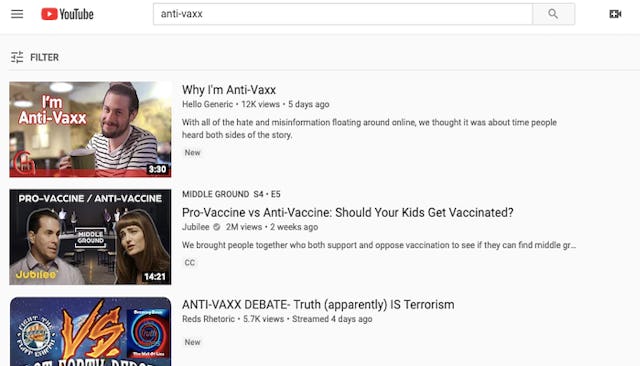YouTube Is Officially Cracking Down On Anti-Vaccination Videos

This means content creators will be unable to make money from ads on their videos
As vaccinations continue to make headlines, YouTube made a decisive move to side with the good guys this week, banning channels that promote anti-vax propaganda from being paid for advertisements.
The video sharing website announced the decision, stating it falls under a policy aimed at prohibiting the monetization of videos that may have “harmful or dangerous” content.
“We have strict policies that govern what videos we allow ads to appear on, and videos that promote anti-vaccination content are a violation of those policies. We enforce these policies vigorously, and if we find a video that violates them, we immediately take action and remove ads,” a YouTube spokesperson told BuzzFeed News.
This comes on the heels of multiple organizations pulling their advertisements from content that has anti-vax messaging. It seems ad revenue speaks louder than the more than 120 cases of measles outbreaks that have been reported since the beginning of 2019, but nonetheless, the outcome is a positive one.
Buzzfeed recently reported that YouTube’s “Up Next” algorithm also suggested follow up recommendations for anti-vax videos to viewers. YouTube’s existing policies prohibit ads from appearing on videos that promote anti-vaccination content (which means they can’t make ad share money like other videos), but apparently, some were slipping through the cracks.
Seven separate advertisers said they were not aware their ads appeared during videos like “Mom Researches Vaccines, Discovers Vaccination Horrors and Goes Vaccine Free,” which pushed an anti-vax stance.
In addition to demonetizing this content, YouTube has introduced a new information panel specifically for vaccines. In the past, these panels appeared on anti-vax videos that explicitly mentioned the measles, mumps, rubella (MMR) vaccine. Now, they will also appear and be directed to the Wikipedia page for “vaccine hesitancy,” which the World Health Organization listed as “one of the top ten global health threats of 2019.”
California Rep. Adam Schiff sent a letter recently to both Facebook and Google asking each company to address the ever-growing anti-vaccination issue. In one such letter, Schiff expressed his “concern that YouTube is surfacing and recommending messages that discourage parents from vaccinating their children, a direct threat to public health, and reversing progress made in tackling vaccine-preventable diseases,” Buzzfeed News reported. YouTube failed to comment or take action, until now.
This month, the social media platform Pinterest blocked all vaccine-related searches on their site in an effort to prevent the spreading of false information. “We want Pinterest to be an inspiring place for people, and there’s nothing inspiring about misinformation,” a Pinterest spokesperson said, per The Hill. “That’s why we continue to work on new ways of keeping misleading content off our platform and out of our recommendations engine.”
To be clear, this does not stop people from posting anti-vax content on YouTube, but the move aims to stop those creators from monetizing advertisements, which will impact their bottom line.
The anti-vaccine creators are still able to generate revenue through merchandise they promote or from donations, but this is a major step in the right direction in combating the misinformation many anti-vaxxers have spread about the dangers of vaccines.
For most of us, the danger that only exists if people chose not to vaccinate, compromising those who are unable to be vaccinated and the herd immunity that all of us depend on for our health and safety. Well done YouTube for being a part of the solution.